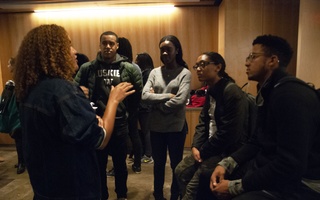In the autumn of 2015, Austin Mueller ’17 rode the Hershey railroad to a regional capital in Cuba. Originally the aristocracy’s train to the plantations, it’s now owned by the Cuban government. “On the way,” he explained, “there was an explosion; the train broke and almost derailed. Then, the conductor took off his conductor shirt, ran into the woods, and came back with his friend and a pickup truck, and they offered us a ride in front of the hotel, and they were offering us homemade rum. And what I noticed during the stop was how people were so selfless and willing to help: even if people knew nothing about engineering, they were asking what they could do.” Study abroad is like that - always moving in unexpected ways, but differently, more fluidly, than Harvard. A train stops, and people don’t grumble, but offer to help.
That same autumn in Morocco, I traveled from Rabat to Fez at dusk in a busy, crowded train where I met an engineer with no job prospects. The next day, we walked through the clamoring marketplace full of tourists, past camel-leather belts, hands of Fatima, meters of fabric, to the alleyway shop of a nomadic herbalist. A group of teenage boys offered me a flower, and I carried it past centuries-old buildings and pristine gardens with vacationing families and roses in every color. I returned from the trip by train, too, then walked back through the familiar streets of Rabat, colorful and glittering, dusty and full of cats, where I could disappear in the souk as if I belonged. I ate couscous with my host family; we talked, and we rested.
Ileana Riveron ’17 took boats with her eight-person classes, traveling to professor's houses on different Greek islands, places that they've since invited both her and her entire family to visit. She drove to the parliament, to the “weirdly Soviet-esque” Communist Party headquarters, to a general strike where someone was throwing tear gas, to a monastery in the mountains to meet with a nun. She walked to where the refugees came in, from boats she did not see, to the graffiti in Athens that said “welcome, refugees, you are home”, and was astonished by their resilience, pride, and humor.
Studying abroad is kinetic. “You wake up every day,” Riveron said, “with an excitement and awareness of the world. You have a different way of living: an awareness of people, situations, as if anything could become an adventure. To live that heightened experience, even for a while, is such a gift.”
If you know where to look, Harvard gives you thousands upon thousands of dollars, hands you the world, and tells you “Take. Taste. Make it your home (as much as you can).” And most Harvard students eventually go abroad for a summer, a winter, or a few weeks. But Ileana and Austin and I, unlike most Harvard students, studied abroad for a semester.
In some ways, the dearth of term-time study abroad makes sense. Harvard is a wonderful place, itself full of adventures—intellectual discoveries, hidden gardens, receptions with world-renowned guests. And it’s kinetic, too: even in the summer, Cambridge is in constant motion. But this motion can often be a stressful, non-reflective one. People walk with their heads down, checking emails; they take trains for the destinations, their next obligation and coffee spurring them forward. At its best, study abroad is moving to places that you never would’ve gone before, taking countryside trains to unknown destinations, and also having time to breathe. That’s what makes study abroad special: it’s kinetic, but it gives you time to stand still.
The final way Riveron chose to exemplify her adventures—which she specifically contrasted with Harvard—is telling: “I could go to a restaurant and had the time to drink a three year old glass of wine; and there I could sit, and journal, and process.” When you’re abroad, even as the new experiences flash by, you remember.
Being abroad is strange—so unlike Harvard!—you’re constantly moving, but also have time to stand still. You’re constantly meeting people, but you also have time to reflect on people, to form lifelong relationships. I’d like to capture this: the feeling of being on a bus along the Mediterranean, the difficulty of encountering human suffering, the restless, restful gift of being abroad.
The author is a student adviser for Harvard’s Office of International Education, but she does not write in her official capacity as an OIE student adviser. The views expressed in this article are those of the author and do not reflect the official position of the OIE.
Siobhan S. McDonough ’17 is a Social Studies concentrator living in Kirkland House. Her column appears on alternate Mondays.
Read more in Opinion
Class BarriersRecommended Articles
-
No HeadlineProfessor Cohn is giving three lectures a week to the French course at Wellesley during Professor See's absence abroad.
-
A WORD OF WELCOME.The CRIMSON extends its heartiest welcome to all the delegates, who are coming to Cambridge for the inauguration of President
-
 Why Don’t We Study Abroad?
Why Don’t We Study Abroad? -
Office Uses Coffee Chats to Encourage Study AbroadSince the beginning of the semester, the Office of International Education has used a new coffee chat program to reach out to students in Harvard’s 12 undergraduate Houses in the hopes of attracting more students to study abroad programs.
-
 Student Advisers Encourage Students of Color to Study Abroad
Student Advisers Encourage Students of Color to Study Abroad













